🥗 The Role of Diet in Hair Health
Your diet has a profound impact on the health, strength, and appearance of your hair. The foods you eat provide your body with the essential nutrients required for hair growth, repair, and maintenance. By following a balanced diet rich in vitamins, minerals, and proteins, you give your hair the best chance to grow strong, shiny, and vibrant.
But what nutrients are the most important for your hair? Vitamins such as A, C, D, and E, along with minerals like iron and zinc, are vital for promoting healthy hair. Protein is another cornerstone of hair health, as hair is primarily made of keratin, a type of protein. Understanding which nutrients your hair needs and incorporating them into your meals can significantly improve its overall quality and resilience.
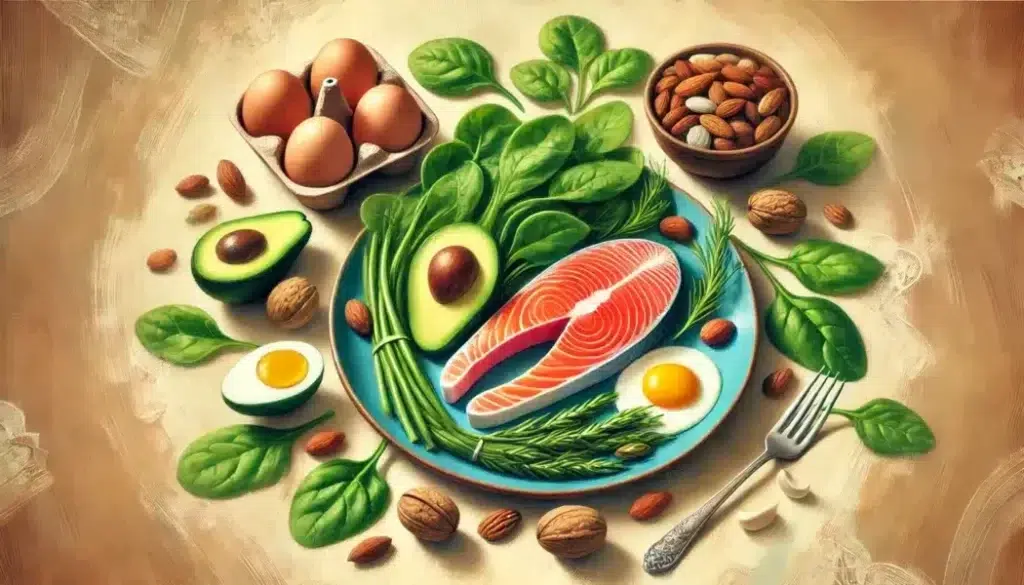
💊 Essential Nutrients for Hair Health
Vitamins and minerals play critical roles in maintaining healthy hair, and each serves a unique purpose:
- Vitamin A: Supports the production of sebum, an oily substance that moisturizes the scalp and prevents dryness. Without sufficient sebum, hair can become brittle and prone to breakage.
- Vitamin C: Essential for collagen production, which strengthens hair strands, and helps the body absorb iron, a key mineral for hair growth.
- Vitamin D: Often associated with hair follicle cycling, it keeps follicles active and ensures continuous hair production.
- Vitamin E: A powerful antioxidant that improves blood circulation in the scalp, delivering essential nutrients to hair follicles.
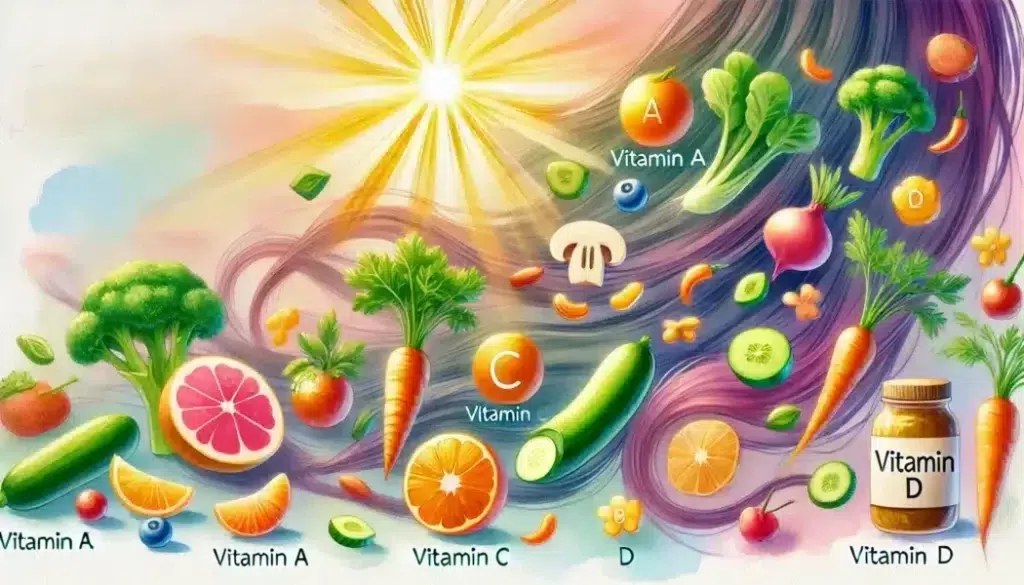
5. Iron and Zinc are equally important:
- Iron facilitates oxygen transport to hair follicles through red blood cells, and a deficiency can lead to hair thinning or shedding.
- Zinc aids in tissue repair, supports oil gland function around hair follicles, and fortifies the scalp against damage.
Protein is also vital, as it forms the building blocks of keratin, the structural protein that gives hair its strength and integrity.
🍳 Top Foods to Boost Hair Health
Foods that help prevent hair loss include pumpkin seeds, which are rich in zinc and reduce hair shedding while promoting follicle health, as well as bell peppers and carrots, which support a healthy scalp environment due to their high beta-carotene content. Whole grains, such as fortified cereals and whole-grain bread, provide iron and B vitamins that nourish the scalp and prevent hair thinning. Even the best hair care products cannot replace a well-balanced diet—nourishing your body from within is the most effective way to combat hair loss.
If you aim for thicker, fuller hair, a diet rich in quinoa, beans, lentils, blueberries, and oysters can make a significant difference. Quinoa, as a complete protein, strengthens hair strands, while beans and lentils, packed with iron, protein, and biotin, improve density and resilience. Blueberries, loaded with antioxidants, protect hair follicles from oxidative stress, and oysters, due to their high zinc content, promote tissue repair and hair growth.
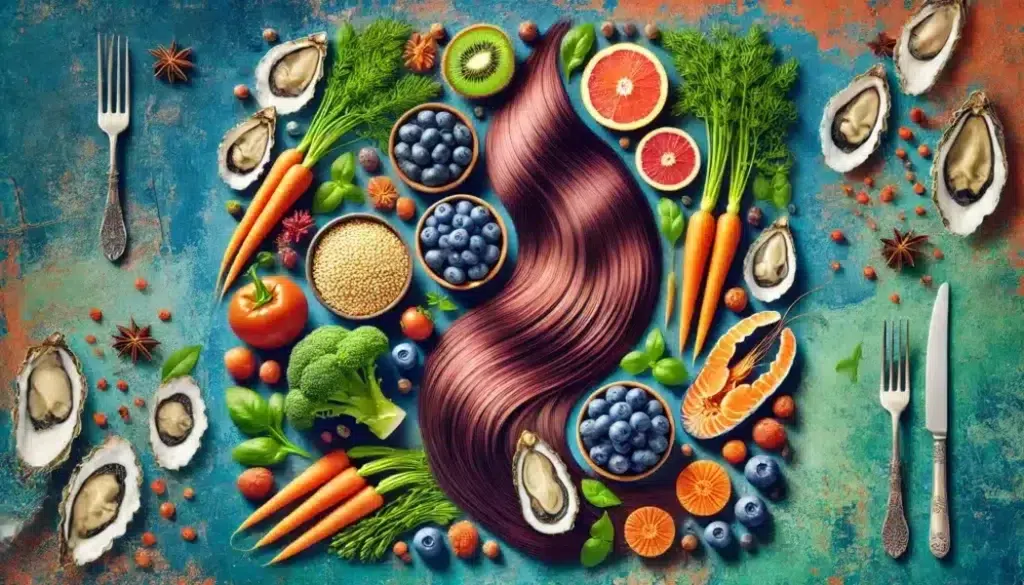
Other foods, such as eggs, spinach, fatty fish, avocados, nuts, sweet potatoes, Greek yogurt, and legumes, also play vital roles. These foods are rich in proteins, vitamins (like biotin and Vitamin E), omega-3 fatty acids, and minerals, helping to strengthen hair structure, stimulate growth, and add natural shine. Regularly including these nutrient-rich foods in your diet establishes a solid foundation for strong, resilient, and shiny hair.
⚠️ Avoiding Key Risk Factors for Hair Damage
In addition to eating a nutrient-rich diet, avoiding specific risk factors is essential for maintaining healthy hair:
- Stress: Prolonged stress disrupts the hair growth cycle, leading to thinning and shedding. Managing stress through relaxation techniques like deep breathing or meditation can mitigate its effects.
- Smoking and Pollution: Environmental factors like smoking and pollution can damage hair follicles and scalp health. Quitting smoking and minimizing exposure to pollution can significantly benefit your hair.
- Excessive Alcohol: Overindulging in alcohol depletes essential nutrients, weakening hair over time. Limiting alcohol intake helps maintain hair strength and density.
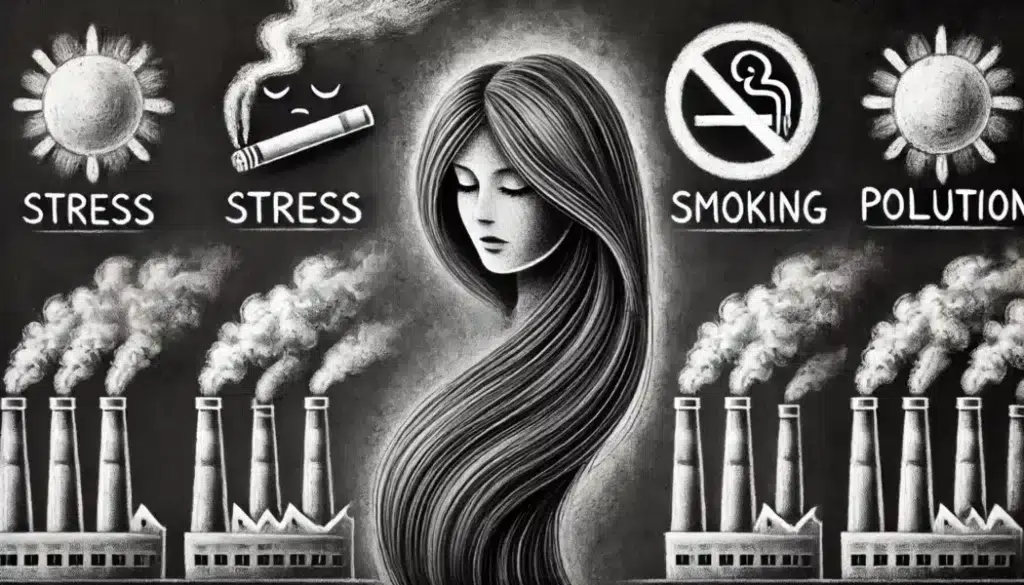
By adopting healthier habits and avoiding harmful risk factors, you create an optimal environment for hair to thrive.
🧴 Modern Solutions for Hair Care
Sometimes, dietary changes alone aren’t enough to achieve your desired hair health. Modern solutions can provide additional support:
- Hair Growth Lotions and DHT Blockers: These products counteract the effects of dihydrotestosterone (DHT), a hormone linked to hair loss, while promoting follicle health.
- Supplements for Hair Growth: Nutritional supplements containing biotin, zinc, and Vitamin D address deficiencies and strengthen hair from within.
- Stress-Reducing Supplements: Adaptogens like ashwagandha and B-complex vitamins help manage stress-related hair loss and support overall wellness.
- Laser Therapy: This innovative treatment uses low-level light to stimulate hair follicles, improve blood flow, and encourage regrowth. Laser therapy is safe, non-invasive, and widely accessible.
By combining a balanced diet with modern treatments and avoiding harmful habits, you can achieve healthier, stronger, and more beautiful hair.
Stay with us — the best is yet to come.
By following our advice, you’re doing the most you can for your hair.
Be the first to know when we publish new guides, tests, and proven strategies for stronger, healthier hair.
👉 Visit the About Me page to learn more about my journey, mission, and why helping people with hair health is so personal to me.
Want healthier, stronger hair? Discover 8 science-backed habits that protect your scalp and boost natural growth. Get your free PDF guide today!
Disclaimer: This article is for informational purposes only and is not a substitute for professional medical advice. Sensitive claims are supported with scientific references, and full product details can always be found on the official websites of the respective manufacturers or distributors.
Some links in this article are affiliate links. If you choose to make a purchase through them, I may earn a small commission at no extra cost to you — helping me keep HairGrowGenius running. Thank you for your support!

✅ FAQ Section for Post: Best Food for Strong Hair
❓ How do healthy fats support strong hair growth?
Healthy fats, such as omega‑3 fatty acids found in fatty fish and nuts, improve blood circulation to the scalp and help reduce inflammation around hair follicles. This creates a more supportive environment for hair to grow stronger, shinier, and less prone to breakage.
❓ Can crash diets damage hair even if I eat nutrient-rich foods?
Yes. Crash diets can lead to temporary hair shedding (telogen effluvium) due to a sudden drop in calories and essential nutrients. Even if your food choices are healthy, extreme caloric restriction can shock the hair cycle. Recovery may take 3–6 months after returning to a balanced diet.
❓ Which micronutrient deficiencies most impact hair health?
Deficiencies in iron, biotin, vitamin D, and zinc are among the most common causes of weak, thinning hair. These nutrients play key roles in cell regeneration and follicle function. Including whole-food sources like leafy greens, shellfish, nuts, and eggs can help restore hair strength and density.
🧾 Last updated: June 2025 based on latest research.

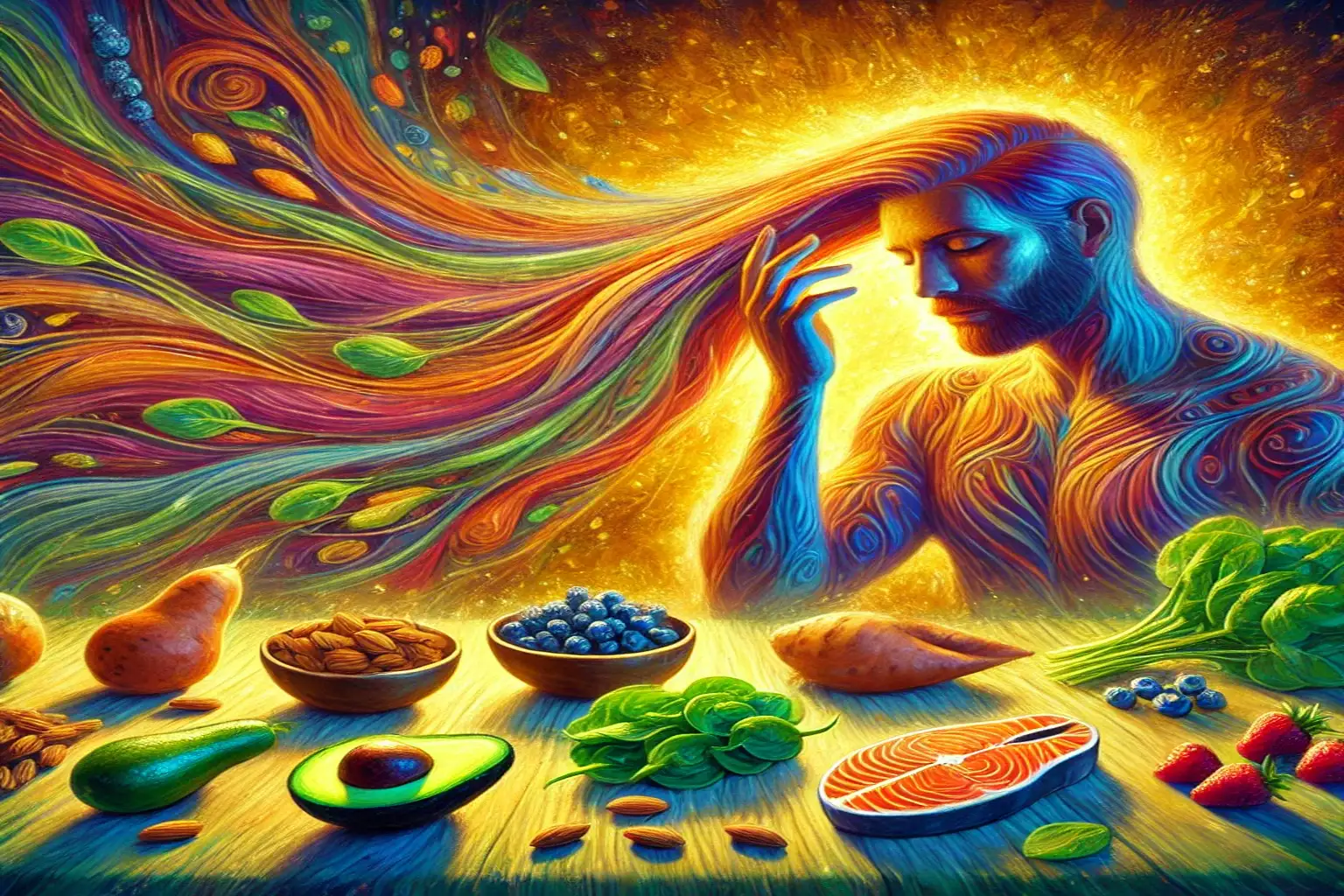
Leave a Reply